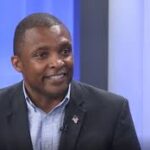Check out the website: https://lenspoliticalnotes.com Look at the recent Political Notes and Len’s Letters on the website:
July 26th, 2023 Political Note #577 Don Davis North Carolina 01
2024 General Election

I have no idea what North Carolina’s Congressional districts will look like in 2024. Tim Moore may know.
A few months ago, the US Supreme Court ruled the North Carolina Supreme Court had the authority to declare the North Carolina districts inconsistent with the state constitution. The North Carolina Supreme Court’s ruling led to the 2022 election in which 7 Republicans and 7 Democrats were elected to Congress. That’s not going to happen in 2024.
The current North Carolina Supreme Court, which now has a Republican majority, overturned the anti-gerrymandering decision. Will the North Carolina delegation have 8 Republicans? 10? 12? after the North Carolina legislature finishes its work? Tim Moore may know.
Tim Moore is the Speaker of the North Carolina House of Representatives. The very first redistricting priority of the North Carolina House of Representatives is to create a Congressional District which will elect Tim Moore to Congress. I have no idea what that means for Don Davis.
If all things were to remain equal, which they will not, Don Davis would not find it easy to reelected in 2024. In 2022, he won by 12,216 votes. Call him the 19th most vulnerable Democratic member of Congress on the basis of the closeness of the 2022 election alone.
North Carolina’s first congressional district is rural, low income (median household income is $46,702), 47% white and 43% Black. Joe Biden got 54% of the vote in 2020. In 2016, Hillary Clinton got 68% of the vote as did Barack Obama in 2012. Since 1992, the district has elected an African American to Congress in every election. From the Civil War to 1990, with a two-term exception of electing a Populist, NC 01 elected a white Democrat to Congress.
Don Davis’s close election in 2022 to replace fixture GK Butterfield may have reflected the same changes in the district that led to Joe Biden’s relatively small margin in 2020. The district runs along the North Carolina/Virginia border and includes most of the northeastern corner of the state. That corner begins in the east with Raleigh’s eastern suburbs and the City of Greenville.
First term Congressman Don Davis needs to accumulate resources and prepare for the extent to which further redistricting adds to the threat to his reelection. In 2020, he was fortunate to have Sandy Smith as his opponent. She was subject to scrutiny for having run over her first husband before walloping him with a frying pan and for waking up her second husband by repeatedly smacking him with a clock radio.
Don Davis was born in Snow Hill, North Carolina near Greenville. He graduated from high school in Texas, then left Texas for Colorado to attend the Air Force Academy. He served as an officer for eight years. Don Davis’s most sensitive work was as a mortuary officer, supporting the bereaved families of Air Force men and women killed in action. He was not going to make the Air Force his career; he had his eye on civilian life. He just was not quite sure in what field of civilian life he would achieve success: education, religion, or politics.
Don Davis made progress in life the conventional way — schooling plus work. He piled one academic degree on top of another. He got a Master’s Degree in administration from Central Michigan, an MA in sociology from East Carolina followed by a doctorate in leadership in education from East Carolina. That was not the end of it. He completed the courses required by the Presbyterian Church of America for its Lay Minister Program.
By 2001, Don Davis had returned to Snow Hill for long enough so that, at age 29, he was elected mayor of the town of 1,500 people. He extended his political career in 2008 when we won the Democratic primary and runoff and the election to the State Senate. He had to demonstrate his political persistence. He lost the election in 2010, won in 2012 and continued to win until he was elected to Congress.
Don Davis had returned to North Carolina to study and teach at East Carolina University. Initially, he was an ROTC instructor. Subsequently, he taught, as an assistant professor of aerospace studies, courses in leadership and in national security. Still listed on the faculty there, he is not teaching courses. His wife, Yuvonka Davis, got her BA from East Carolina as well. She is Principal of Greene County’s Kindergarten and Prekindergarten Center. Her description of the school’s programs make you feel you would like your four-year old to attend.
Don Davis’s first priority in Congress, as it was as a State Senator, is improving the economy of his rural district. He brought infrastructure projects to his district as a State Senator. The infrastructure law passed under Joe Biden’s leadership will give this rural district a chance to revive after years of neglect. Part of that bill is money for rural broadband access in North Carolina – no small matter.
Don Davis will be pleased if he can do as well in health care. A 2021 study found that since 2005, four rural hospitals closed in the state and 15 more were vulnerable. Don Davis intends to address what he describes as a medical crisis – a crucial issue for his community. He is clear that women should make medical decisions with their doctors without interference from the government. The crisis he sees is for the maternal health of Black women, noting that African American women have a pre-term birth rate 48% higher than the state average.
Consistent with his commitment to his district, Don Davis is on the Agriculture Committee and was chosen to be the Vice Ranking Member of that Committee. In addition to the Congressional Black Caucus, he joined the fiscally moderate and culturally progressive New Democratic Coalition and is vice chair of the Farm Bill Task Force.
Don Davis, in effect, announced himself as a moderate by joining the Problem Solvers Caucus, a group composed of an equal number of Republicans and Democrats. He was also assigned to the Armed Services Committee, apt for his military experience and particularly important for North Carolina because there are 8 active military installations in the state.
Notwithstanding the uncertainty about what districts will look like, I urge you to provide support for Don Davis now. Every Democratic incumbent in North Carolina will need help in protecting himself or herself. Don Davis has not been just waiting around. He has already raised $373,000 and, as of July 1, had $284,000 available to defend himself.
Two Republicans in the existing NC 01 have raised money as well. Sandy Smith is back and has spent about half of the $270,000 she raised. She had $144,500 remaining to continue her campaign. Fred Von Canon is another former candidate. He raised $110,000 and is holding on to that money. Waiting until we know what the district lines will be would deprive Don Davis and other Democrats of resources they need to fight their fight. Help Don Davis now.
Five Incumbent Southeastern Democrats who could find reelection a challenge. In addition to Don Davis, two are from North Carolina. Two more are from Florida where Ron DeSantis would eliminate the Democratic Party if he could.
Wiley Nickel of NC 13 is the most vulnerable Democratic incumbent in the southeast. An attorney and descendent of the owner of much of central California, he is #10 on Len’s List of vulnerable Democrats in the House. He begins on July 1 with $700,000 in his campaign bank account. The Republican in what is now NC 13 with the most money on hand has $335,000.
Abigail Spanberger of VA 07 is #21 on Len’s List of vulnerable Democratic incumbents. She raised $1.2 million and still has that much available to spend. Her probable Republican opponent has raised $350,000 and spent about $50,000 of that. Keep her a million dollars ahead of her opponent.
Jared Moskowitz of FL 23 and the #22nd most vulnerable Democratic incumbent has not yet drawn an announced opponent. He has raised $310,000 and spent about half of that so far. A freshman Congressman, the more he raises, the more effective Jared Moskowitz will be in discouraging a serious opponent.
Darren Soto of FL 09 was first elected to Congress in 2016. He is #23 on Len’s List. He has raised $350,000 this early in the campaign and spent $140,000. Of the five Republicans who reported raising funds only one raised more than $1,000. A recently announced former county commissioner may be more formidable.
Kathy Manning of NC 06 is #31 according to my calculations of vulnerable Democratic incumbents. While there is not much she can do to prevent redistricting, she is arming herself for the campaign and had $580,000 available as of July 1.
Democrats have only two Congressional targets in the southeast – both completing their first term of office. One is in Virginia, the other in Florida.
First term Member of Congress Jennifer Kiggans of VA 02 is #16 on Len’s List of vulnerable Republican Members of Congress. She has $1.1 Million available to spend as of July 1, 2023. There is a long way to go and she will raise more. The Democrats do not yet have a candidate.
First term Member of Congress Anna Paulina Luna of FL 13 is #26 on Len’s List of vulnerable Republican Members of Congress. She had $450,000 available to spend as of July 1, 2023. There is a long way to go and she will raise more. The Democrats do not yet have a candidate.
